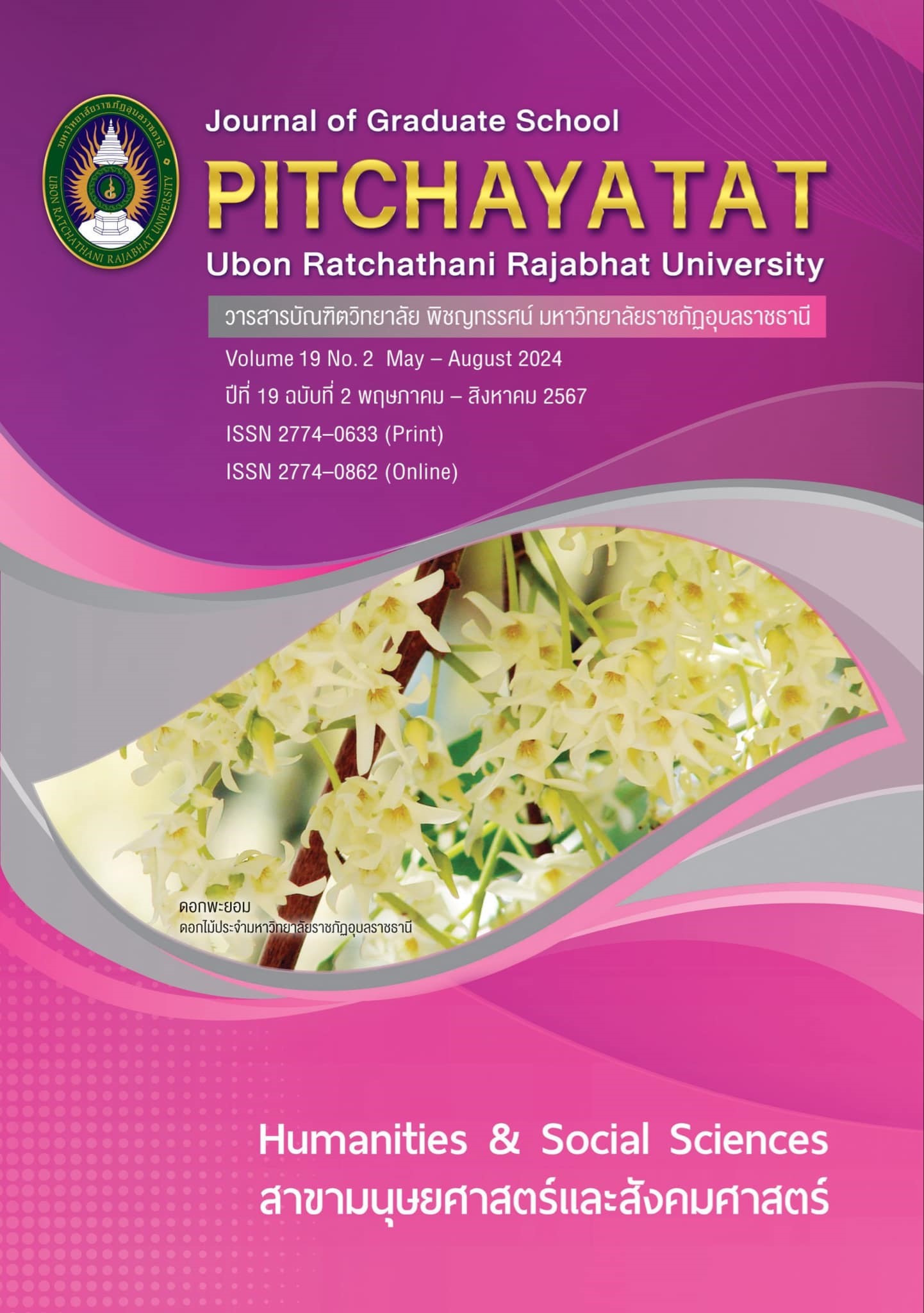รูปแบบการจัดการภาวะวิกฤตที่มีประสิทธิผลของโรงเรียนเอกชนระดับปฐมวัย
คำสำคัญ:
รูปแบบการจัดการภาวะวิกฤต, การจัดการภาวะวิกฤต, โรงเรียนเอกชน , ระดับปฐมวัยบทคัดย่อ
การวิจัยครั้งนี้มีวัตถุประสงค์เพื่อ 1) ศึกษาความต้องการจำเป็นของการจัดการภาวะวิกฤตของโรงเรียนเอกชน ระดับปฐมวัย 2) พัฒนารูปแบบการจัดการภาวะวิกฤตที่มีประสิทธิผลของโรงเรียนเอกชน ระดับปฐมวัย และ 3) ประเมินรูปแบบการจัดการภาวะวิกฤตที่มีประสิทธิผลของโรงเรียนเอกชน ระดับปฐมวัย โดยใช้ระเบียบวิธีวิจัยแบบผสานวิธีพหุระยะ ตัวอย่าง ได้แก่ ผู้บริหารสถานศึกษา จำนวน 346 คน ใช้วิธีการสุ่มแบบหลายขั้นตอน เครื่องมือที่ใช้ ได้แก่ แบบสอบถาม และแบบประเมิน วิเคราะห์ข้อมูลโดยการหาค่าเฉลี่ย ส่วนเบี่ยงเบนมาตรฐาน และ ค่า PNImodified
ผลการวิจัยพบว่า
- ความต้องการจำเป็นของจัดการภาวะวิกฤตที่มีประสิทธิผลของโรงเรียนเอกชน ระดับปฐมวัย มีค่า PNImodified อยู่ระหว่าง .06-.08 โดยระยะที่มีค่า PNImodified สูงสุดคือ ระยะก่อนวิกฤต (PNImodified=0.08) รองลงมาคือ ระยะวิกฤต (PNImodified=0.07) และระยะหลังวิกฤต (PNImodified= 0.06)
- การพัฒนารูปแบบการจัดการภาวะวิกฤตที่มีประสิทธิผลของโรงเรียนเอกชน ระดับปฐมวัยพบว่า ได้รูปแบบการบริหารความต่อเนื่องของโรงเรียนเอกชนระดับปฐมวัย โดยองค์ประกอบของรูปแบบ 5 องค์ประกอบ ได้แก่ 1) วัตถุประสงค์ของรูปแบบ 2) หลักการของรูปแบบ 3) องค์ประกอบหลักของรูปแบบ ประกอบด้วย 3 ระยะได้แก่ (1) ระยะก่อนวิกฤต (2) ระยะวิกฤต และ (3) ระยะหลังวิกฤต 4) การประเมินรูปแบบ และ 5) เงื่อนไขความสำเร็จในการใช้รูปแบบ
- การประเมินรูปแบบการจัดการภาวะวิกฤตที่มีประสิทธิผลของโรงเรียนเอกชน ระดับปฐมวัย พบว่า ความถูกต้อง ความเหมาะสม และความเป็นไปได้โดยภาพรวมอยู่ในระดับมากที่สุด
เอกสารอ้างอิง
เกรียงศักดิ์ เจริญวงศ์ศักดิ์. นำและบริหารยามวิกฤต:บทเรียนจากโควิด-19. กรุงเทพฯ: ซัคเซส พับลิชชิ่ง, 2563.
คณะกรรมการพัฒนาระบบราชการ, สำนักงาน. คู่มือการบริหารความพร้อมต่อสภาวะวิกฤต. กรุงเทพฯ: สำนักงานคณะกรรมการพัฒนาระบบราชการ, 2563.
คณะกรรมการส่งเสริมการศึกษาเอกชน, สำนักงาน. สถิติการศึกษาเอกชน. (ออนไลน์) 2562 (อ้างเมื่อ 7 กรกฎาคม
. จาก https://opec.go.th
จริยา โกเมนต์ และเฉลิมชัย ปัญญาดี. “รูปแบบการตัดสินใจและการตอบสนองต่อภาวะวิกฤตขององค์กรปกครองส่วนท้องถิ่นในพื้นที่ภาคเหนือตอนบน ประเทศไทย กรณีการแพร่ระบาดของโรคติดเชื้อไวรัสโคโรน่า 2019 (โควิด-19),” วารสารสถาบันพระปกเกล้า. 20, 3 (กันยายน-ธันวาคม 2565): 5-33
ชัยเสฏฐ์ พรหมศรี. "การบริหารวิกฤตการณ์," วารสารนักบริหาร. 30, 4 (พฤศจิกายน 2553): 197-203
ฐานริณทร์ หาญเกียรติวงศ์ และรุจิกาญจน์ สานนท์. "ภาวะผู้นำการบริหารในภาวะวิกฤตสู่การพัฒนาอย่างยั่งยืน," วารสารเครือข่ายส่งเสริมการวิจัยทางมนุษยศาสตร์และสังคมศาสตร์. 3, 2 (พฤษภาคม-สิงหาคม 2563): 105-118.
บุญชม ศรีสะอาด. วิธีการทางสถิติสำหรับการวิจัย เล่ม 1. พิมพ์ครั้งที่ 5. กรุงเทพฯ: สุวีริยาสาส์น, 2556.
ประชาสัมพันธ์, กรม. คู่มือการปฏิบัติงานประชาสัมพันธ์ในภาวะวิกฤต. กรุงเทพฯ: ม.ป.ท., 2545.
วรีย์นันทน์ สิริกรกาญจนา และคณะ. “รูปแบบการบริหารสถานศึกษาเอกชนระดับปฐมวัยภายหลังการแพร่ระบาดของโรคติดเชื้อไวรัสโคโรนา 2019 (โควิด-19) ในเขตกรุงเทพมหานคร,” วารสารสังคมศาสตร์และมานุษยวิทยาเชิงพุทธ. 7, 12 (ธันวาคม 2565): 55-70.
เลขาธิการสภาการศึกษา, สำนักงาน. รายงานเรียนออนไลน์ยุคโควิด-19 : วิกฤตหรือโอกาสการศึกษาไทย. กรุงเทพฯ: สำนักงานเลขาธิการสภาการศึกษา, 2563.
Castro, E. V. d. Canibal Metaphysics. Minneapolis: Univocal,2014.
Owaduge S.B. Crisis Management in Secondary School: The Roles of Stakeholders. Nigeria: Adekunle Ajasin University, 2005.
UNESCO. UNESCO’s education response to COVID-19. (online) 2021 (cited 7 July 2022) Available from https://www.unesco.org
WHO. Coronavirus disease (Covid-19) pandemic. (online) 2021 (cited 7 July 2022). from https://www.who.int
ดาวน์โหลด
เผยแพร่แล้ว
รูปแบบการอ้างอิง
ฉบับ
ประเภทบทความ
สัญญาอนุญาต
ลิขสิทธิ์ (c) 2024 วารสารบัณฑิตวิทยาลัย พิชญทรรศน์ มหาวิทยาลัยราชภัฏอุบลราชธานี

อนุญาตภายใต้เงื่อนไข Creative Commons Attribution-NonCommercial-NoDerivatives 4.0 International License.
บทความทุกเรื่องได้รับการตรวจความถูกต้องทางวิชาการโดยผู้ทรงคุณวุฒิภายนอกอย่างน้อย 3 คน ความคิดเห็นในวารสารพิชญทรรศน์เป็นความคิดเห็นของผู้นิพนธ์มิใช่ความคิดเห็นของผู้จัดทำ จึงมิใช่ความรับผิดชอบของวารสารพิชญทรรศน์ และบทความในวารสารพิชญทรรศน์สงวนสิทธิ์ตามกฎหมายไทย การจะนำไปเผยแพร่ต้องได้รับอนุญาตเป็นลายลักษณ์อักษรจากกองบรรณาธิการ





